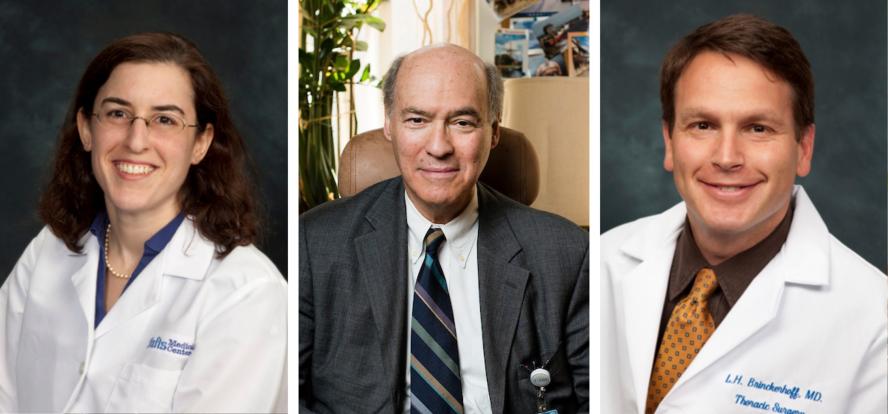-
About
- Departments & Offices
-
Academics
- Public Health
- Biomedical Sciences
- Physician Assistant
- Special Master’s (MBS)
-
Admissions & Financial Aid
- Tuition & Fees
-
Student Experience
-
- Student Resources by Program
- Academic & Student Support
- Wellness & Wellbeing
- Student Life
- Events & Traditions
-
-
Research
- Research Labs & Centers
- Tufts University-Tufts Medicine Research Enterprise
-
Local & Global Engagement
- Global Health Programs
- Community Engagement
Endowed Clinical Clerkship Directorships
Three historic gifts support Tufts’ core clerkship directors, and outstanding clinical education

By Kris Willcox
“Clerkship directors are the hidden heroes of Tufts’ clinical education,” said Peter Bates, MD, Interim Dean of Tufts University School of Medicine, “and we want the world to know how important they are.” Bates made these remarks at an online celebration in December 2020, marking the creation of three endowed clinical clerkship directorships—the first in the school’s history. Like endowed professorships, these directorships will provide ongoing financial support, and an honored position within the medical school, for each recipient.
During their third-year clerkships, “our students first experience what it means to be a doctor,” said Dean Bates. At the heart of this vital component of Tufts’ medical education are the clinical clerkship directors, who lead six core rotations in medicine, pediatrics, surgery, psychiatry, family medicine and obstetrics/gynecology, at more than 20 clinical sites.
“I feel incredibly lucky to work with our clerkship directors who are really dedicated to students’ development, and their well-being,” said Amy Kuhlik, MD, Dean of Student Affairs. She noted that clerkship directors have a lasting, one-to-one impact on students as teachers and mentors, and are also “the educational leaders of their disciplines,” ensuring that the content and objectives in each clerkship reflect the latest developments in medicine and pedagogy, and that clerkships at every site meet the same rigorous standards.
Laura K. Snydman, MD, FACP, is Overall Core Clerkship Director for Medicine and the inaugural holder of the Dean Harris A. Berman, MD, Clerkship Directorship. Dr. Berman and his wife, Ruth Nemzoff, made their gift to celebrate his 10 years as dean of the medical school and support outstanding faculty like Dr. Snydman. Leading the medicine clerkship is “a perfect job for me,” says Dr. Snydman. She is inspired to see students grow and mature during each eight-week rotation, and draws great satisfaction from faculty development, designing curricula, and mentoring students as they apply for residency.
"For me, the biggest change in the students during the third year is that they realize, for the first time, that it's more about the person, the patient, the family, and the interaction, than it is about the grade,” says Larry Brinckerhoff, MD, Overall Core Clerkship Director for Surgery. Dr. Brinkerhoff is honored to be the first recipient of the Donald Shapiro, MD, M71, and Karlyn Shapiro Clerkship Directorship, created by Dr. Shapiro on the occasion of his 50th reunion. Students in their surgical rotation naturally want to master the technical skills they’ll use in the operating room, says Dr. Brinkerhoff, but the overriding goals of the surgical rotation are to cultivate a deep “understanding of the pathophysiology,” as well as “the thought process and clinical decision making” that physicians bring to the clinic, the Emergency Department and operating room.
Jody Schindelheim, MD, Overall Core Clerkship Director for Psychiatry, and the inaugural recipient of the Hira and Toos Family Clerkship Directorship, agrees that he and other clerkship directors are guiding students through a crucial transition, from classroom learning centered on the student, to experiential learning in the clinic, focused on the patient. During clerkships, he says, students have their first encounters with patients who are experiencing “some of the most intense moments in their lives,” from medical emergencies, to life-changing diagnoses, to end-of-life care. At the same time, they’re learning to interact successfully with many “different personalities and behaviors, not only in patients but in attendings and residents” and balance their personal lives with the unique demands of medicine. “To be part of that development process is quite a privilege,” says Dr. Schindelheim, and being the first to receive this endowed directorship “is really an honor.”
For Tufts graduates of every class and specialty, clerkships are a transformative experience, and clerkship directors have a shaping influence on the pathway from student to physician. Through endowed, named funds for Clerkship Directors, the medical school and the Tufts community can elevate and support this vital work, now and in years to come.
To learn more about Endowed Clinical Directorships, contact Rebecca Scott, Senior Director of Development and Alumni Relations, at 617-636-2777 or rebecca.scott@tufts.edu.